Uncover the secrets of Attalia, an ancient biblical port, and its pivotal role in early Christianity, inviting a deeper exploration into history's mysteries.
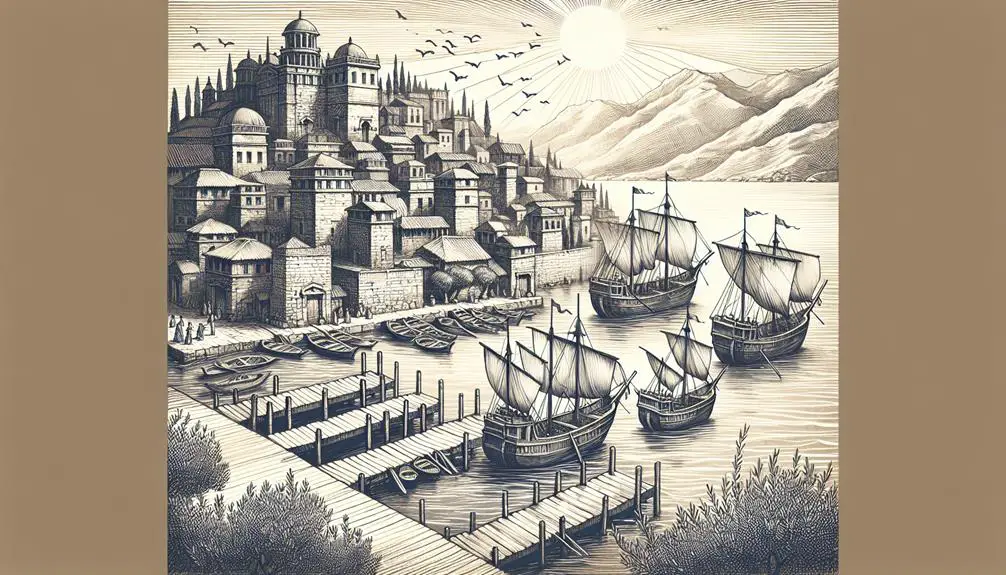
Attalia in the Bible
You've stumbled upon a place in the Bible so intriguing, it could very well rewrite history as you know it—Attalia. This ancient port, mentioned briefly in the Acts of the Apostles as a pivotal point in Paul's missionary journey, holds layers of untold stories and archaeological richness that simply beg to be explored further.
As you peel back the layers of its historical background, role in early Christian evangelism, and the tantalizing hints of what lies beneath the soil, you'll find yourself on the brink of connecting with a past that's as mysterious as it is enlightening.
What secrets does Attalia hold, and how do they shape our understanding of the early Christian world? Let's embark on this journey together, where history and faith intertwine in the most unexpected ways.
Key Takeaways
- Attalia, now known as Antalya, was a significant maritime hub for early Christian missionary activities, including those by Paul and Barnabas.
- Its strategic location facilitated the spread of Christianity across the Mediterranean, making it a pivotal city in early Christian history.
- Archaeological discoveries in Attalia provide insights into early Christian practices, beliefs, and the community's daily life.
- The city's historical and theological significance is underscored by biblical references, highlighting its role in early Christian missionary endeavors.
Biblical Mention of Attalia
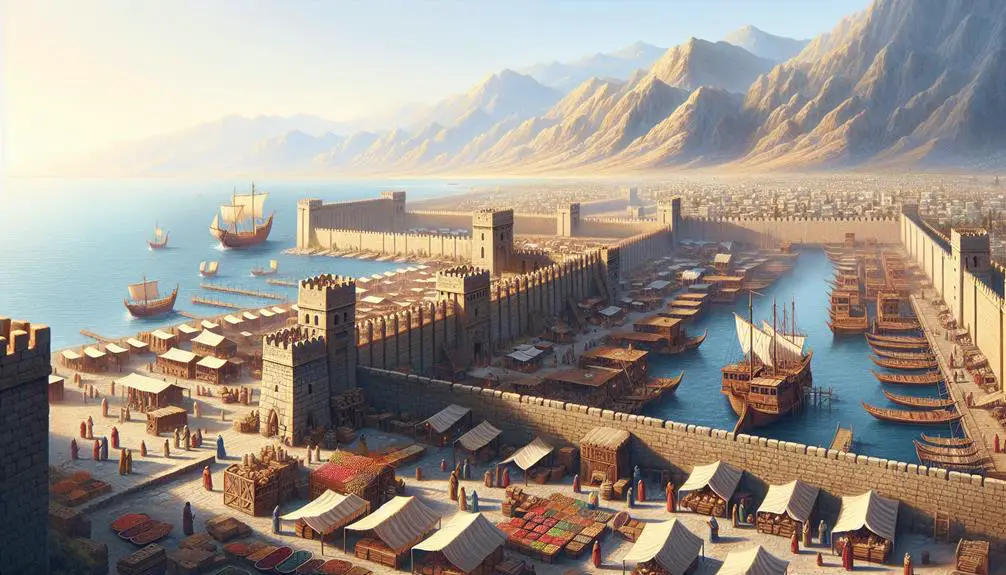
Attalia, now known as Antalya, garners a singular mention in the Acts of the Apostles, serving as a pivotal maritime gateway for Paul and Barnabas on their first missionary journey. This singular reference might seem negligible at first glance; however, deeper analysis reveals its crucial role in the dissemination of early Christianity. Your understanding of Attalia's geographical location and cultural context will significantly enhance your comprehension of its biblical significance.
Situated on the southwestern coast of Asia Minor, Attalia's strategic geographical location as a port city facilitated not only trade but also the movement of ideas and religious beliefs. This port was an essential link between the Mediterranean basin and the Anatolian hinterland, making it a bustling hub of cultural and economic exchange. The cultural context of Attalia during Paul and Barnabas's visit was marked by a rich tapestry of Hellenistic and Roman influences. This blend of cultures provided a fertile ground for the introduction of new religious ideas, such as those propagated by Paul and Barnabas.
Your grasp of Attalia's role goes beyond a mere geographical waypoint; it embodies a critical juncture in the spread of early Christianity. The city's position at the crossroads of diverse cultural currents made it an ideal starting point for missionary endeavors. Paul and Barnabas's decision to navigate through Attalia underscores the strategic importance they placed on reaching varied audiences, leveraging the city's connectivity to extend their missionary reach. This analytical perspective highlights how geographical and cultural factors intertwined, shaping the trajectory of early Christian missionary activities.
Historical Background
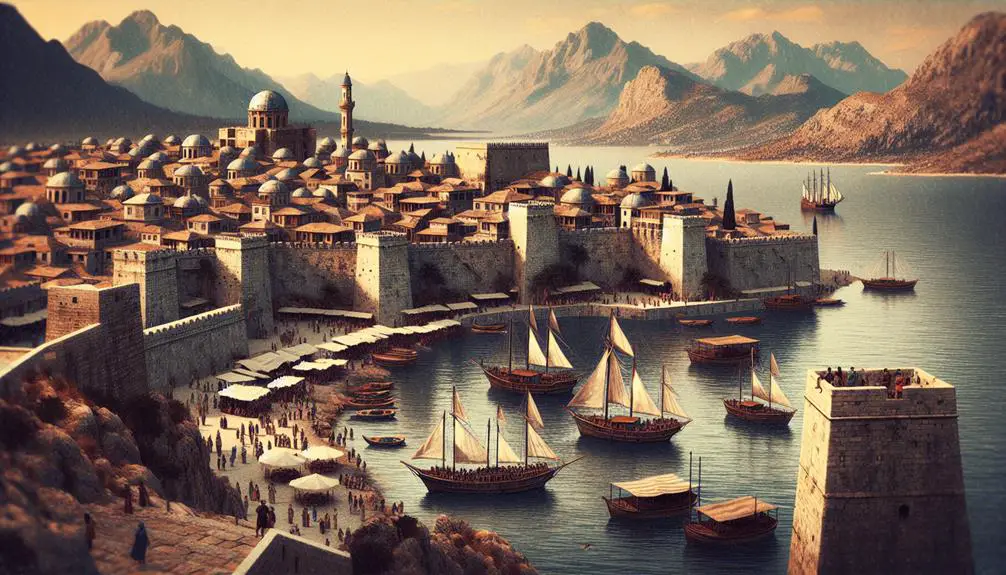
Delving into the historical backdrop of this region reveals a complex tapestry of power dynamics, cultural exchanges, and significant events that shaped Attalia's role in the ancient world. You're encountering a city that not only thrived on ancient trade but also benefited immensely from its strategic geographic location. Situated at a crossroads of land and sea routes, Attalia's ports buzzed with activity, bringing wealth and diverse influences from across the Mediterranean and beyond.
The city's significance in ancient times can't be overstated. It served as a crucial gateway for merchants, armies, and ideas, influencing the cultural and political landscapes of the region. Here are five key aspects that highlight the historical importance of Attalia:
- Its strategic location facilitated robust ancient trade networks, connecting East and West.
- Attalia was a melting pot of cultures, where ideas and traditions from different civilizations intermingled.
- The city played a pivotal role in regional power struggles, often serving as a sought-after prize for conquering armies.
- Its harbors witnessed the dawn of new eras, as merchants and explorers set sail for unknown territories.
- The legacy of Attalia's ancient prominence is reflected in the archaeological remains that continue to fascinate scholars and visitors alike.
This analytical dive into Attalia's past reveals a city that was much more than a mere footnote in history. Its geographical advantages and role in ancient trade networks underscored its importance, shaping the course of events in the ancient world and leaving a lasting impact that resonates to this day.
Attalia's Role in Paul's Journey
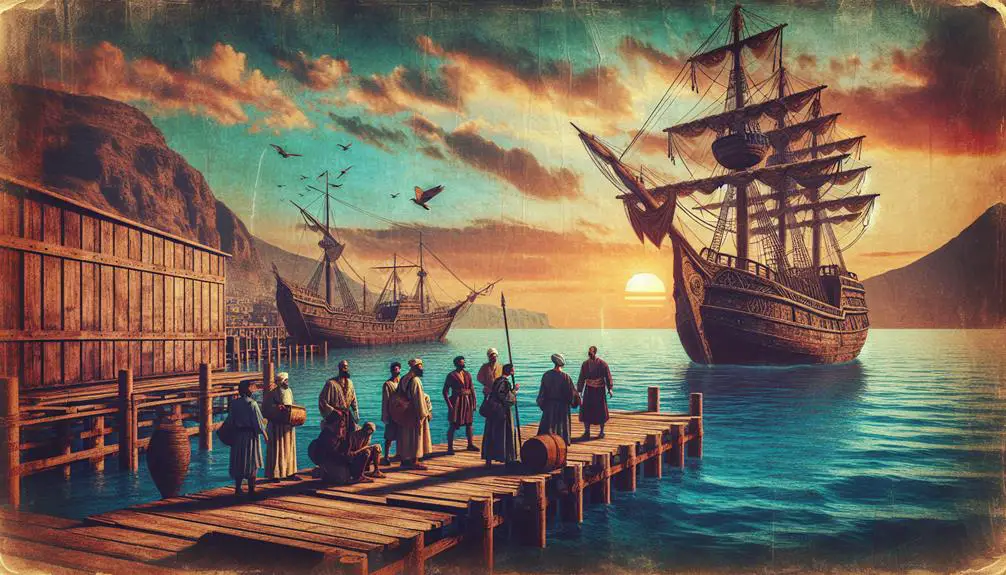
As you explore the narrative of Paul's missionary journey, it becomes evident that Attalia played a crucial role as a strategic departure point, facilitating his travels and the spread of Christianity across the Mediterranean. This ancient port, known for its pivotal position along key maritime routes, served not just as a logistical hub but as a critical juncture in the Apostle's departure from Asia Minor to other parts of the Roman Empire.
Delving deeper, you'll find that Attalia's significance extends beyond mere geography. The city's accessibility to various seaways allowed for smoother transitions and enhanced connectivity between different missionary destinations. This ease of movement was vital for Paul and his companions as they endeavored to disseminate the Christian message. The utilization of maritime routes from Attalia underscores the strategic planning that underpinned the Apostle's missionary efforts, illustrating a profound understanding of the period's nautical pathways.
Moreover, Attalia's role in Paul's journey symbolizes a broader theme of transition and outreach within early Christianity. The Apostle's departure from this port marks a significant moment of both literal and figurative embarkation towards new horizons in spreading the Gospel. It highlights the interplay between strategic geographic positioning and the missionary zeal that characterized the early Christian movement.
In essence, Attalia was more than a mere point on a map for Paul and his missionary undertakings. It represented a gateway to the wider Mediterranean world, facilitating the spread of Christianity through well-chosen maritime routes. The city's role in the Apostle's departure encapsulates a blend of strategic foresight and divine mission, underscoring its importance in the historical narrative of early Christian evangelism.
Archaeological Insights
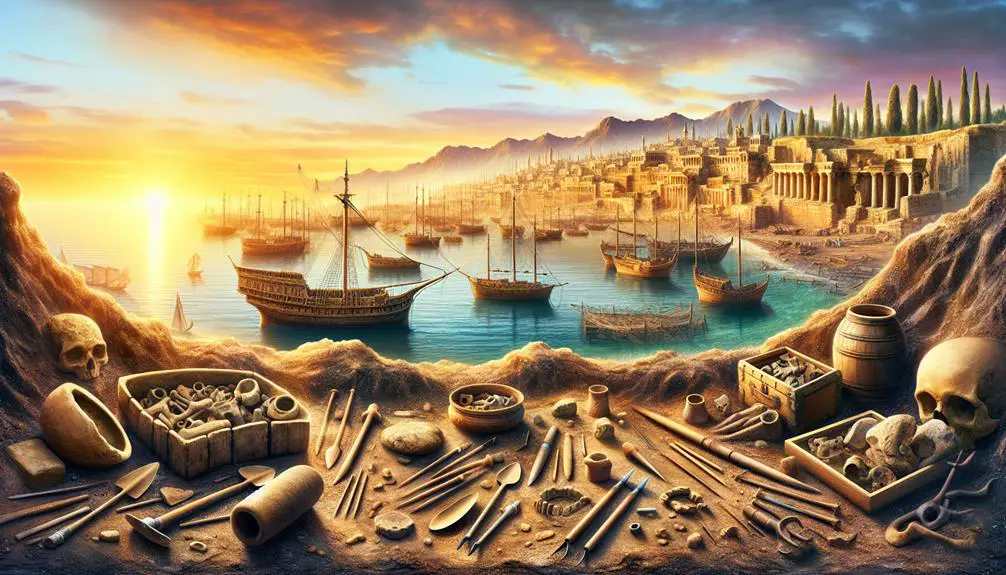
Recent excavations in the ancient city reveal artifacts and structures that offer a deeper understanding of Attalia's role in early Christian missionary activities. As you delve into the layers of history, you encounter the tangible remnants of a past that speaks volumes about the pioneering efforts of early Christians. The excavation challenges and artifact preservation efforts shed light on the dedication of archaeologists to unraveling these historical truths.
Here are some findings that evoke a profound sense of connection to Attalia's ancient inhabitants:
- Discoveries of early Christian symbols carved into stone, suggesting the presence of a vibrant faith community.
- Remnants of homes and meeting places, providing insight into the daily lives and spiritual practices of early Christians.
- Pottery shards and coins, offering clues to the economic activities and trade networks that sustained the city.
- Inscriptions and manuscripts that hint at the theological discussions and teachings prevalent among the early Christians in Attalia.
- Conservation efforts to preserve delicate artifacts, highlighting the challenges faced in keeping the history of Attalia alive for future generations.
The analytical and detailed examination of these archaeological finds offers a window into the complexities of life in ancient Attalia. The dedication to overcoming excavation challenges and ensuring artifact preservation underscores the importance of this work. Through these scholarly endeavors, you're invited to appreciate the resilience and faith of those early Christian communities, providing a richer understanding of their contributions to the spread of Christianity.
Theological Significance

Building on the archaeological discoveries in Attalia, it's crucial to explore the theological implications these findings have on our understanding of early Christian practices and beliefs. The remnants of early Christian communities in Attalia provide a unique lens through which you can examine the evolution of divine metaphors and their role in shaping the religious landscape. These findings offer a tangible connection to the past, allowing for a deeper comprehension of how early Christians navigated their spiritual experiences and expressed their faith.
The presence of artifacts and inscriptions related to early Christian worship in Attalia opens up discussions on the prophetic implications of such practices. You're invited to consider how these communities interpreted divine messages and integrated them into their daily lives. The archaeological evidence suggests a rich tapestry of religious expression, where divine metaphors weren't merely literary devices but lived experiences that connected individuals to the divine.
Moreover, the analysis of these discoveries sheds light on the dynamic nature of early Christian theology. You're confronted with the reality that doctrinal interpretations and religious practices were in a state of flux, influenced by both internal developments and external pressures. This realization challenges any monolithic understanding of early Christianity, highlighting the diversity and adaptability of these early communities.
In essence, the theological significance of the archaeological findings in Attalia lies in their ability to provide insights into the complex interplay between divine metaphors, prophetic implications, and the lived reality of faith. These elements collectively contribute to a richer, more nuanced understanding of early Christian practices and beliefs, offering valuable perspectives for contemporary theological discourse.
Frequently Asked Questions
How Has Modern-Day Antalya (Formerly Known as Attalia) Retained or Transformed the Biblical Heritage of the Ancient City?
You'll find that modern-day Antalya, once Attalia, has transformed its biblical heritage by integrating ancient architecture and maritime history into its modern identity.
The city's careful preservation of ruins and historical sites allows you to immerse yourself in the past while experiencing the vibrancy of contemporary life.
Its ports, echoing centuries of maritime tradition, serve as gateways to understanding how ancient practices have shaped today's cultural and economic landscapes.
Are There Any Contemporary Cultural or Religious Festivals in Antalya That Trace Their Origins Back to the Biblical Attalia?
You're curious about contemporary festivals in Antalya with roots stretching back to ancient times.
While specific festivals directly tied to biblical Attalia mightn't be prominent, the city's cultural continuity is palpable.
Events blending tradition and modernity reflect its rich history.
Delving into festival origins, you'll find cultural layers that, although not explicitly biblical, embody the spirit of Antalya's ancient past, showcasing a seamless blend of heritage and contemporary celebration.
How Does the Portrayal of Attalia in the Bible Compare to Its Depiction in Non-Biblical Ancient Texts or Traditions?
Exploring ancient texts, you'll find Attalia's depiction varies from its biblical portrayal. Ancient navigation and economic significance are central themes.
In non-biblical sources, Attalia emerges as a crucial maritime hub, underpinning its wealth and strategic importance. This contrasts with its biblical representation, focusing more on spiritual narratives.
Analyzing these differences, you understand how Attalia's role and perception evolved, influenced by its economic and navigational prominence in ancient civilizations.
In What Ways Have Local Communities in the Area of Modern-Day Antalya Preserved or Honored the Memory of Saint Paul's Visit as Described in the Bible?
You're exploring how modern-day Antalya's local communities have kept the memory of Saint Paul's journey alive. Through community traditions and the mapping of Paul's routes, there's a tangible connection to his biblical travels. These practices don't just preserve history; they embody a living heritage that links the past to the present.
Analysis of these traditions reveals a deep-seated respect and honor for Paul's visit, showcasing a scholarly appreciation for their historical and religious significance.
What Role Does Attalia Play in the Religious Tourism Industry of Turkey Today, and How Is Its Biblical History Marketed or Presented to Visitors?
You're hitting the nail on the head when you dive into how Attalia plays a pivotal role in Turkey's religious tourism industry.
It's a beacon for archaeological tourism, drawing visitors keen to explore its biblical history woven into the city's fabric.
This historical allure is adeptly marketed, blending culinary influences that echo the past, presenting a unique narrative that captures the essence of its storied past to scholars and tourists alike.
Conclusion
In sum, Attalia isn't just a dot on the biblical map; it's an epicenter of theological earthquakes. Its stones whisper secrets of Paul's footsteps, turning the soil into a manuscript of divine journeys.
This city, embedded in the crust of history, played a chess game with destiny, positioning itself as a pivotal square in Paul's missionary journey. Attalia's archaeological layers unfold like the pages of a celestial book, offering insights that could leave even the most seasoned scholars spellbound.
Its story is a testament to the monumental impact of seemingly minor biblical locales, challenging us to dive deeper into the sacred texts, where every name and place holds universes of meaning waiting to be unraveled.



Sign up